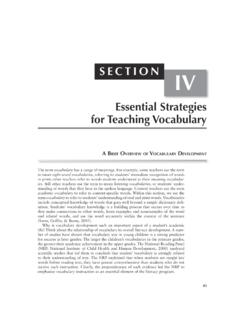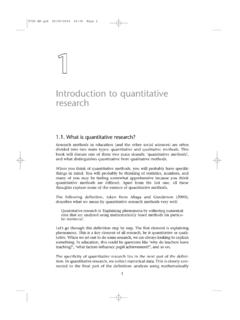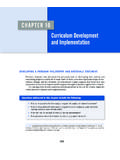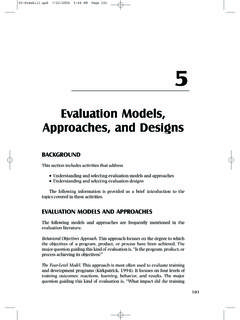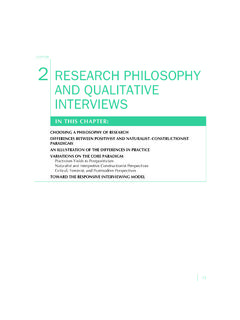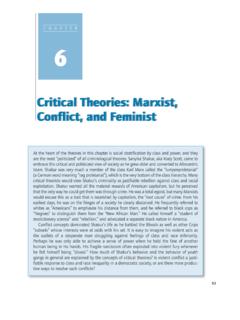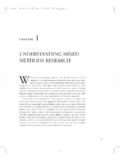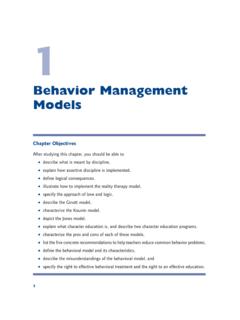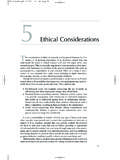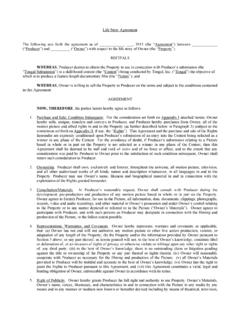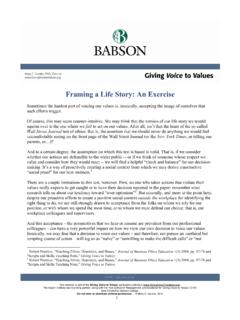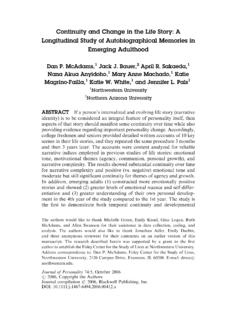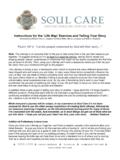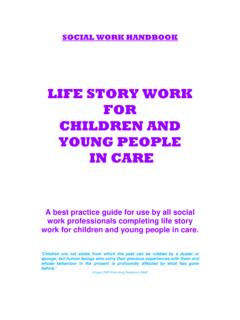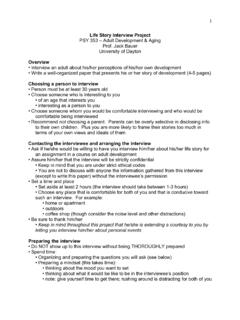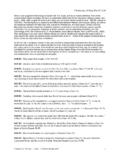Transcription of Exploring Psychological Themes Through Life-Narrative …
1 1. Exploring Psychological Themes Through Life-Narrative Accounts Dan P. McAdams M y task in this chapter is to introduce and illustrate an approach to narrative analysis that enjoys considerable currency in cognitive sci- ence and in contemporary personality, developmental, social, clinical, and cultural psychology. The approach takes as foundational the propositions that (1) people construct and internalize stories to make sense of their lives, (2) these autobiographical stories have enough Psychological meaning and staying power to be told to others as narrative accounts, and (3) these nar- rative accounts, when told to Psychological researchers, can be analyzed for content Themes , structural properties, functional attributes, and other cate- gories that speak to their Psychological , social, and cultural meanings.
2 Over the past decade, narrative approaches to Psychological inquiry have impacted many forms of Psychological research. Cognitive scientists study the nature and course of autobiographical memory and its role in identity development (Conway & Pleydell-Pearce, 2000; Thomsen & Berntsen, 2008). Developmental psychologists examine the origins of story compre- hension and storytelling in childhood (Fivush & Haden, 2003) and the emergence of life - story schemas in adolescence (Habermas & Bluck, 2000). 15. 16 PART I Analyzing Stories Personality psychologists chart relationships between life stories, personality traits, and Psychological well-being (Bauer, McAdams, & Sakaeda, 2005.)
3 McAdams et al., 2004) while arguing that a person's internalized and evolving story of the self what many psychologists today term narrative identity . constitutes a distinct layer of personality itself (McAdams, 2008; McAdams &. Pals, 2006). Social psychologists explore how selves are narrated and per- formed in particular situations and social contexts (McLean, Pasupathi, &. Pals, 2007). Cultural psychologists describe how individuals appropriate and negotiate society's master narratives in the making of self (Hammack, 2008). Clinical and counseling psychologists cast an empirical eye on psychotherapy as a major venue for life - story transformation (Adler, Skalina, & McAdams, 2008; Lieblich, McAdams, & Josselson, 2004).
4 And Psychological scientists have developed a range of new methodologies for collecting and analyzing Life-Narrative data (Baddeley & Singer, 2007; King, 2003). Across the many different arenas of empirical research, the Psychological study of life narratives tends to take one of two very different forms. In what philosophers of science call the context of discovery (Reichenbach, 1938), researchers may explore open-ended narrative accounts for broad patterns, Themes , images, and qualitative characterizations in order to gen- erate new theories about lives or to understand a single (and typically note- worthy) life in full. In the context of justification, by contrast, researchers may seek to test hypotheses as they play out in many different lives, typi- cally employing well-validated coding systems and some form of statistical analysis.
5 These two contexts for Psychological science complement each other: Qualitative discovery research generates new hypotheses to be evalu- ated in systematic ways, and the results of hypothesis-testing studies inform new narrative explorations. In what follows, I highlight three representative attempts to analyze life - narrative accounts, drawn from research that my students and I have con- ducted over the past decade. Operating purely in the context of discovery, this chapter's first example is a qualitative study of how especially creative academics narrate their professional and personal lives (McAdams & Logan, 2006). The second example documenting a 15-year long research program on the redemptive self illustrates how insights gained from the context of discovery can be tested as hypotheses in the context of justification (McAdams, 2006; McAdams & Bowman, 2001; McAdams, Reynolds, Lewis, Patten, & Bowman, 2001; McAdams, Diamond, de St.)
6 Aubin, & Mansfield, 1997). The third example illustrates the reverse process how quantitative findings from hypothesis-testing studies on the life narratives of political conservatives and liberals (McAdams & Albaugh, 2008; McAdams et al., 2008; McAdams, Hanek, & Dadabo, under review) can be applied, in an CHAPTER 1 Exploring Psychological Themes 17. exploratory and provisional manner, to the single case in this instance, the life and presidency of George W. Bush (McAdams, 2011). narrative in the Context of Discovery In the context of discovery, a Psychological researcher explores a particular phenomenon in detail in order to develop new ways of describing and under- standing the phenomenon.
7 The phenomenon might be a particular psycho- logical process, a psychologically significant situation or experience, or even a noteworthy individual life . The research process is largely inductive that is, the researcher begins with concrete observations of the phenomenon itself and attempts to develop a more abstract description of or theory about the phenomenon. In Life-Narrative research, the phenomenon to be observed (and interpreted) is likely to be a set of psychologically rich and detailed autobiographical stories, often derived from interviews of people who pres- ent some sort of problem or question for the researcher. The researcher aims to address the problem or question by examining the stories in depth.
8 The researcher does not have ready-made answers for the problem or question. (If answers already existed, there would be no need to do research in the context of discovery.) Based on past reading and experience, however, the researcher probably has a few hunches. In the first example of Life-Narrative research in psychology (drawn from McAdams & Logan, 2006), I describe an exploratory study of the life stories told by 15 university professors who have made significant scholarly contri- butions to their respective disciplines. Beyond stand-alone autobiographies, few empirical studies have systematically examined how academics narrate their scholarly lives and how those narrations may or may not relate to their lives outside the world of research and scholarship.
9 What kinds of stories do creative academics in the arts and sciences tell about their own scholarly work? How do they describe the development of their intellectual projects, collaborations, and insights? Do their narratives of creative work bear any resemblance to the stories they tell about their personal lives? These were the research questions that guided our exploration. Based on our reading of the scattered research literature on creativity ( , Gardner, 1993; Gruber, 1989), we began with a few hunches that provided some guidance for our exploration, but if truth be told, we were pretty clueless about what, if any- thing, we might discover.
10 Adapting a life story interview protocol used in past studies (McAdams, 1993), we asked each participant (all esteemed professors from a research university) to describe the overall trajectory of his or her scholarly life and 18 PART I Analyzing Stories then to focus on four particular scenes that stand out in the story : an opening scene (describing how interest in the area of scholarship may have originated), a professional high point, a low point, and a turning point. Extending the story into the future, we also asked the participant to imagine the next chapter in the professional story . We then asked each participant to narrate according to a similar format the story of his or her personal life , focusing on family and relationships.

